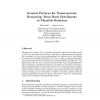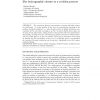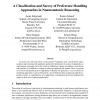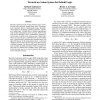137
click to vote
JOLLI
1998
15 years 1 months ago
1998
When reasoning about complex domains, where information available is usually only partial, nonmonotonic reasoning can be an important tool. One of the formalisms introduced in thi...
102
click to vote
JANCL
2000
15 years 2 months ago
2000
Two levels of description of nonmonotonic reasoning are distinguished. For these levels semantical formalizations are given. The first level is defined semantically by the notion o...
128
click to vote
IGPL
2000
15 years 2 months ago
2000
This paper has two goals. First, we develop frameworks for logical systems which are able to re ect not only nonmonotonic patterns of reasoning, but also paraconsistent reasoning....
126
click to vote
CORR
2002
Springer
15 years 2 months ago
2002
Springer
Many systems that exhibit nonmonotonic behavior have been described and studied already in the literature. The general notion of nonmonotonic reasoning, though, has almost always ...
104
click to vote
CORR
2000
Springer
15 years 2 months ago
2000
Springer
The connections between nonmonotonic reasoning and belief revision are well-known. A central problem in the area of nonmonotonic reasoning is the problem of default entailment, i.e...
CI
2004
15 years 2 months ago
2004
In recent years, there has been a large amount of disparate work concerning the representation and reasoning with qualitative preferential information by means of approaches to no...
115
click to vote
AMAI
2008
Springer
15 years 2 months ago
2008
Springer
We provide a description of generalized default logic as a unified formalism for nonmonotonic reasoning. Special attention will be paid to the role of the monotonic logic underlyi...
125
click to vote
AAAI
2006
15 years 3 months ago
2006
Recently, Lakemeyer and Levesque proposed a logic of onlyknowing which precisely captures three forms of nonmonotonic reasoning: Moore's Autoepistemic Logic, Konolige's ...
127
click to vote
LANMR
2007
15 years 3 months ago
2007
Abstract We introduce some differences in the style defeasible information is represented and inferences are made in nonmonotonic reasoning. These, at first sight harmless, chang...
110
click to vote
ICLP
1991
Springer
15 years 5 months ago
1991
Springer
Well Founded Semantics is adequate to capture nonmonotonic reasoning if we interpret the Well Founded model of a program P as a (possibly incomplete) view of the world. Thus the W...




